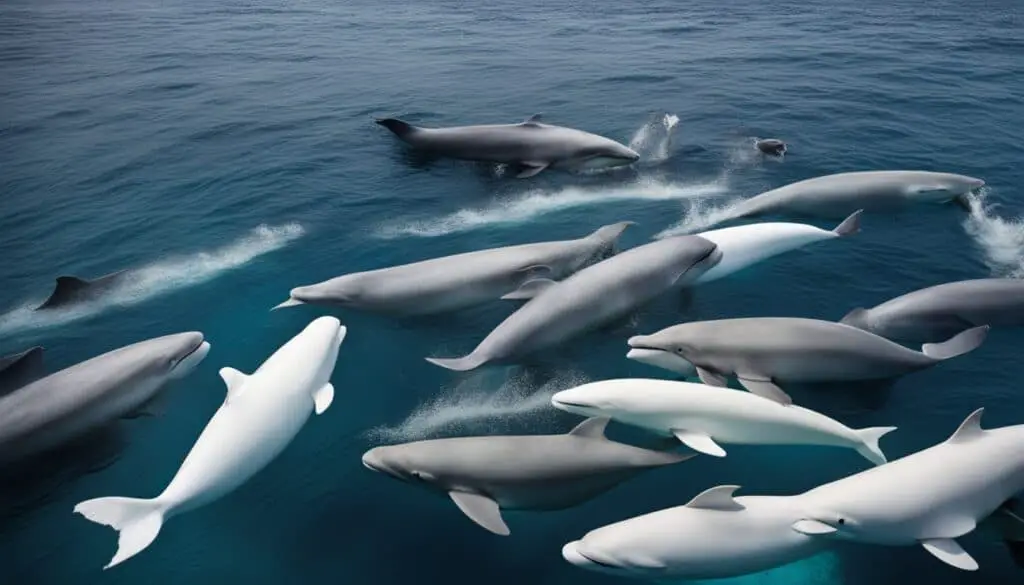Beluga whales live about 30 to 35 years in the wild. But, they can live up to 50 or 70 years with the right conditions. This shows how important their environment is and the threats they face.
Exploring belugas reveals more about their long lives and what affects them. You’ll see why we need to protect these amazing whales and their homes.
Beluga Whale Lifespan Overview
Beluga whales are fascinating creatures known for their unique traits and adaptability. They typically live between 30 to 35 years. However, some can live up to 70 years in ideal conditions. Knowing how long beluga whales live helps us understand their health and how to protect them.
The lifespan of beluga whales depends on many factors. Scientists use different methods to figure out their ages. They look at growth patterns and reproductive health. This helps us learn more about beluga whales and how to save their populations.
Knowing how old beluga whales get helps researchers understand their populations better. It also helps in making plans to protect them. This knowledge is key for saving these amazing marine animals.
How long do beluga whales live?
Beluga whales live a long time, typically from 30 to 35 years on average. Some can live over 50 years. This shows how long these amazing sea creatures can live.
Average Age of Beluga Whales
The average age of beluga whales is important for understanding their life. Many things affect their lifespan, like their environment and genes. Since many belugas live into their thirties, we can see how strong they are.
Beluga Whale Life Expectancy
Beluga whales can live more than 50 years in the best conditions. This long life affects their numbers in the wild. Studies on their teeth help us learn more about how they age.
| Age Range | Life Expectancy | Longevity Insights |
|---|---|---|
| 0-30 years | Common | Healthy individuals tend to survive into their thirties |
| 31-50 years | Occasional | Increased risks affect aging whales |
| Over 50 years | Rare | Indicates exceptional health and environmental conditions |
Factors Affecting Beluga Whale Lifespan
Understanding what affects beluga whale lifespan helps us see how different things impact their health and life. Each factor is important in deciding how long these amazing whales live.
Environmental Influences
Environmental conditions greatly affect beluga whale longevity. Things like water temperature, salt levels, and pollution levels affect their food and health. Clean water and plenty of food help belugas live longer. But, pollution, especially in places like the St. Lawrence River, is a big threat to them.
Health and Disease
Beluga whales face many diseases that can cut their lives short. Their health and disease risk depend a lot on their living conditions. In polluted areas, they may get sick from harmful substances, leading to ongoing health problems. Keeping an eye on their health is key to finding ways to reduce these risks.
Human Impact
Human actions have a big impact on beluga whales’ lifespan. Things like fishing, destroying their homes, and climate change mess with their natural world and food. These actions can make them stressed, lower their ability to have babies, and increase death rates. It’s important to understand how we affect them to help protect them.
Beluga Whale Aging Process
The aging process of beluga whales is quite fascinating. Scientists use different methods to learn about their lifespan and biology. They focus on the growth layers in teeth to understand how age affects these marine mammals.
Each layer in the teeth represents a year of growth. This makes the teeth a reliable way to tell how old a whale is.
Growth Layer Groups in Teeth
Growth layers in teeth help scientists figure out how old beluga whales are. These layers form every year, similar to tree rings. By counting these layers, researchers can tell the age of a beluga whale.
This method requires careful measurements and analyzing the teeth’s structure. It gives a clear picture of the whale’s growth over time.
Age Estimation Techniques
There are many ways to estimate the age of beluga whales. Besides looking at growth layers in teeth, scientists also consider environmental factors and health status. This approach helps us understand beluga longevity better.
| Age Range (Years) | Growth Layer Groups Observed | Common Techniques Used |
|---|---|---|
| 1-5 | 1-5 GLGs | Dental section analysis |
| 6-10 | 6-10 GLGs | Layer counting |
| 11-15 | 11-15 GLGs | Histological examination |
| 16+ | 16+ GLGs | Combination of methods |
Beluga Whale Mortality Rate
Understanding the beluga whale mortality rate is key to knowing the threats they face. Predation and pollution greatly affect their lives.
Predation and Natural Threats
Polar bears and killer whales prey on beluga whales. Adults are less at risk, but young ones are more vulnerable. This threat affects the mortality rate, especially where these predators are common.
Impact of Pollution
Pollution has a big impact on beluga whales. Industrial pollutants harm their homes and health. Heavy metals and pesticides make them sick and hurt their ability to reproduce.
This pollution lowers their numbers and raises the mortality rate. It’s why saving these whales is so important.
Conservation Status and Longevity of Beluga Whales
The conservation status of beluga whales is very important for their survival. Even though they are listed as “Least Concern” by the IUCN, they still face many threats. It’s crucial to keep an eye on their numbers to understand their challenges.
Current Population Estimates
About 150,000 beluga whales live in the oceans. This number shows that some areas have a stable population. But, it also points out the dangers they face that could affect their future.
Their survival depends a lot on their living spaces. So, we need to closely watch their conservation status.
Conservation Efforts
It’s vital to have conservation efforts to help beluga whales. These efforts aim to reduce threats like habitat loss, pollution, and climate change. Groups, researchers, and governments work together to protect these whales.
Keeping the public informed and educated is key to saving these marine animals. This helps create a strong plan for their conservation.

Fascinating Facts about Beluga Whale Longevity
Beluga whales live a long time, and their lives are filled with interesting traits. They are social animals, often called the “canaries of the sea.” They use sounds to talk to each other, showing how smart they are at communicating.
Their songs and clicks are key to their social life. They help form bonds and keep their groups together. This shows how important talking is in their social world.
Beluga whales live a long time, which affects their social life. Older whales teach the young how to survive and breed. They share their knowledge, helping the group to do well.
As they get older, their experiences guide the group’s behavior. This makes them crucial for the health of their pods.
Beluga whale longevity is more than just living a long time. It’s about the deep connections they have with each other. Their long lives help keep their groups strong and adaptable. Learning about these amazing creatures shows us how important their long lives are.
FAQ
How long do beluga whales typically live?
Beluga whales usually live about 30 to 35 years in the wild. Some can live up to 50 or 70 years in the best conditions.
What factors affect the lifespan of beluga whales?
Many things can change how long beluga whales live. This includes their environment, food, and health risks from diseases and pollutants.
How do researchers determine the age of beluga whales?
Scientists figure out beluga whale ages by looking at their teeth. These teeth have growth layers that form every year. This helps scientists know how old they are.
What is the beluga whale mortality rate?
Beluga whales can die from many things. This includes being eaten by predators, dangers in their environment, and harm from humans like pollution and destroying their homes.
Are beluga whales considered endangered?
Beluga whales are not considered endangered right now. But, they need protection from losing their homes and other dangers.
How does pollution impact beluga whale longevity?
Pollution can make beluga whales sick, increase diseases, and lower their ability to have babies. This can shorten their lives.
What are the current population estimates of beluga whales?
There are about 150,000 beluga whales worldwide. But, their numbers can change a lot because of their environment and human actions.
What unique characteristics do beluga whales possess?
Beluga whales are called the “canaries of the sea” because they can make many sounds. This shows they have great ways of talking and living together.







